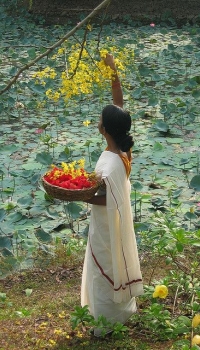So many flowers bloom in my garden
Yet why do I want to leave them behind?
For all of them languish for his return
The one who never even looks back at them.
Has the One who is past recall
Forgotten plucking them at dawn?
Is he not even aware
how to wear them in a garland?
The tears that fall from my eyes
Shine like stars seen at first light.
But these are stars that will fade away
Once dusk falls.
I await the moment when he shall float to the brink
On the darkest of night tides.
I shall then tinge his feet auspicious red
With my merciless barbs.
Bangla
Amaaro Bagaane Eto Phul,
Tobu Keno Chole Jaayei.
Taara Cheye Acche Tari Paane,
Sheto Nahi Phire Chaye.
Bhule Ki Gieche Bhola
Prabhatero Phulo Tola
Jaane Na Ki Porite She
Kushoomo Golai?
Aankhiro Shishero Pate
Phuteche Taara Probhate,
Shukai Jabe Taara
Shanjhero Bela.
Nishiro Ghonnotee Neere,
Jobe She Aashbe Teere.
Chorono Koribo Raanga,
Nithoro Kantai.
Atul Prasad Sen (20 October 1871 – 26 August 1934) was a Bengali composer, lyricist and singer, and also a lawyer, philanthropist, social worker, educationist and littérateur. Atul was born in Dhaka. His maternal grandfather Kali Narayan Gupta initiated Atul Prasad into music and devotional songs. After becoming a Barrister, he returned to Bengal in 1894 and joined with Satyendra Prasanno Sinha, (Lord Sinha), as a Bar-at-Law.
By 1896 he had already began writing songs. His lyrics were heard in every Bengali home. his songs and poems inspired many a young heart in pre-independence days and are cherished even today.
Atul Prasad married his cousin sister Hem Kusum. The marriage was disapproved by their family members. The couple wedded at Gretna Old Parish Church, Gretna Green, Scotland, under the Scottish Law in the year 1900. However, Atul Prasad had a troubled married life. The emotional sufferings he experienced in his life found their ways into his lyrics; and this has made many of his songs full of pathos
After his marriage Atul Prasad started practicing law at Old Baily, London and continued for a very short duration. He came back to India in 1902. He chose the province of Oudh as his field of activity and moved to Lucknow.
In the rendition of his lyrics into music, Atul Prasad used fast-paced Hindustani tunes like Kheyal, Thumri and Dadra skilfully, and was able to add an element of spontaneity on occasions when the tune has transcended the lyrics.
Atul Prasad is credited with introducing the Thumri style in Bengali music. He also pioneered introduction of Ghazals in Bengali.
Atul Prasad's acquaintances with maestros in Urdu and Persian Ghazal inspired him to experiment this particular style to be brought into Bengali music. He created around six or seven Ghazals in Bengali and pioneered a stream of Bengali music which was later enriched profusely by contribution of Kazi Nazrul Islam.
Atul Prasad's introduction of the raga to the Bangla songs had a significant impact on Bengali music, and influenced the songs of Kazi Nazrul Islam and other raga-based modern songs.
Atul Prasad wrote 212 poems and except a few most of the poems were used as songs. Unfortunately, none of the songs were dated and only three are titled. He did not explicitly categorise any of his songs into the category of love. However, many of his songs, having multi-layered association of deep emotional sentiments, bloom into expression of love and lug deep shadow of sadness, which was his constant companion.
